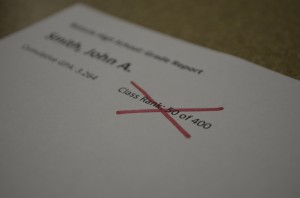As juniors begin the long process of applying to colleges and planning their futures, a common question falls into consideration. Is my application good enough? After all I’ve done in high school, will I get into the college of my dreams?
The competition of getting into good colleges remains intense and many are beginning to wonder the relevance of a once prevalent part of the college acceptance process: class rank. The honors of “valedictorian” and “salutatorian” are no longer presented at most graduations and at a growing number of schools class rank has been abandoned altogether. The primary reasons behind this shift include college admissions offices reviewing applications more holistically, an administrative fear that class rank causes unhealthy competition, and the opinion that class rank fails to accurately portray student success.
According to a recent survey taken by the National Association for College Admissions Counselors (NACAC), between 1993 and 2011 the number of colleges considering class rank of “considerable importance”, has dropped 23%. This doesn’t mean academics are off the hook though. A similar survey released recently, shows that colleges still place academic performance higher in importance than other factors such as sports and community service. So what does that mean for high schools like Batavia who are considering getting rid of one of these measures of academic success? According to The New York Times, some evidence suggests that it is not the colleges that find class rank unimportant. Instead, it’s the high schools that decide to drop class ranks, forcing colleges to adjust their qualifications. Many high school administrations are deciding that the system is simply unfair.
“The class rank model is exclusionary,” Kaneland High School principle Chip Hickman said to the Kane County Chronicle. “A number of students are meeting outstanding benchmarks and are not being recognized for their accomplishments.”
Although this is true, it seems odd that class rank, a tool specially designed to rate academic success, could be judged on its inability to show other accomplishments. What this shift really represents is the “everyone-gets-a-trophy” mentality, where people go out of their way to avoid hurting student’s feelings, even at the cost of those who work very hard to achieve academic success. Although this strategy might help comfort a student who wasn’t able to take any advanced placement courses in high school, it ignores the effort and work that those who were able to succeed academically invested in their education. Taking honors courses or getting straight A’s is a big commitment that not everyone can handle. Class rank is a way for those who achieved success to show pride in their achievement.
“I spend hours working on my homework to get good grades,” said senior Erin Sykstus. “It’s not really fair to take away the acknowledgment for that.”
In the real world people will be judged on their abilities, so shielding students from this in high school is a short-sighted effort to provide comfort. The fact that colleges seem to be stressing class rank less and less is reason enough to let it remain. If it’s not going to greatly influence the admission decision, then why not give the hard-working students something to boast about after all they’ve done to achieve success? Competition is healthy if it helps motivate and improve students’ knowledge, and having some students wear a colored chord on their graduation gown is far from damaging.
Class rank needs to be kept in high schools to reward hard work and keep students motivated to succeed.
